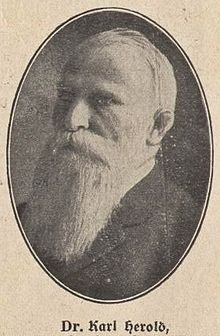Carl Herold
Carl Herold , also Karl Herold (born July 20, 1848 in Loevelingloh , Münster district ; † January 13, 1931 in Münster ) was a German politician at the center .
Life and work
Carl Herold was the son of Ferdinand Herold , who was the first professor for pharmaceutical botany at the Old University in Münster and who, through marriage, had become the owner of the Lövelingloh estate in the Münster district .
After graduating from high school in Münster , Carl first studied at the University of Halle in 1867/68 , but then completed an agricultural training course. In 1870 he took over and ran his father's estate.
He was director of the main agricultural association for the Münster administrative region and was a member of the board of directors of the Chamber of Agriculture for Westphalia , the Westphalian Farmers' Association and the Federation for Rural Welfare. In addition, Herold was chairman of the examination commission for agricultural machines and devices in Westphalia. Director of the Meiereiverband for Westphalia and Lippe. He also sat on the supervisory board of the rural Central Bank and the Association of Rural Cooperatives. Overall, Herold is considered the successor to Burghard von Schorlemer-Alst as a representative of the interests of Westphalian agriculture. But he also had connections to the socio-political wing of the Catholic milieu and therefore belonged to the People's Association for Catholic Germany . Herold was already a member of its predecessor organization "Arbeiterwohl" and was on the advisory board of the Central Office for People's Welfare. Nonetheless, Herold, who was also President of the German Catholic Convention in 1909 , is considered personally conservative. In 1912 he participated in the establishment of the Bartmann & Sohn GmbH cotton spinning mill in Wegberg .
Political party
Herold was a member of the center and from 1906 chairman of the Westphalia Provincial Association . In the party, too, he was primarily a representative of rural interests, but was at times controversial among the peasants. For the Reichstag election in 1924, it was not drawn up by the farmers of the Münsterland, but by a predominantly industrial constituency in South Westphalia.
MP
Herold was a member of the district council in the Münster district for several decades and was also a member of the district committee there. He was also a member of the Provincial Parliament of the Province of Westphalia . From 1890 to 1918 he was a member of the Prussian House of Representatives , where he was deputy chairman of the center group. As a member of parliament, he represented the constituency of Münster 2 (Steinfurt - Ahaus). From 1919 until his death he was a member of the state parliament in Prussia . There he was group leader.
From 1898 to 1918 Herold was a member of the Reichstag of the German Empire. First he represented the constituency of Fulda - Gersfeld - Schlüchtern , from 1903 the constituency of Tecklenburg - Steinfurt - Ahaus . Since Herold was seen as a representative of agrarian interests within the center, the businessman Wilhelm Sträter was nominated as an opposing candidate in the Reichstag election in 1903 by the industrial wing within the center party. In 1919/20 he was a member of the Weimar National Assembly . Then he was again a member of the Reichstag until his death . He opened the fifth parliamentary term of the Reichstag in 1930 as senior president .
family
Carl Herold was married to Maria Kinscherf, who however died prematurely. His son Ferdinand Herold had a doctorate in law and was co-managing director of the fine spinning mill Bartmann & Sohn from 1920 until his untimely death in 1935 .
Individual evidence
- ^ Mann, Bernhard (edit.): Biographical manual for the Prussian House of Representatives. 1867-1918. Collaboration with Martin Doerry , Cornelia Rauh and Thomas Kühne . Düsseldorf: Droste Verlag, 1988, p. 176 (handbooks on the history of parliamentarism and political parties: vol. 3)
- ^ Carl-Wilhelm Reibel: Handbook of the Reichstag elections 1890-1918. Alliances, results, candidates (= handbooks on the history of parliamentarism and political parties. Volume 15). Half volume 1, Droste, Düsseldorf 2007, ISBN 978-3-7700-5284-4 , pp. 170-171.
literature
- Wilhelm Schulte: The (family) Herold. In: Westphalian heads. Münster, 1963. p. 111ff.
- Friedrich Keinemann: From Krumstab to the Republic - Westphalian nobility under Prussian rule 1802 - 1945, 1997, ISBN 3-8196-0541-X , p. 497.
- Karin Jaspers / Wilfried Reinighaus: Westphalian-Lippian candidates in the January elections 1919. A biographical documentation , Münster: Aschendorff 2020 (Publications of the Historical Commission for Westphalia - New Series; 52), ISBN 9783402151365 , p. 87.
Web links
- Literature by and about Carl Herold in the catalog of the German National Library
- Carl Herold in the database of members of the Reichstag
- Biography of Carl Herold . In: Heinrich Best : database of the members of the Reichstag of the Empire 1867/71 to 1918 (Biorab - Kaiserreich)
- Short biography from: Klaus Meyer-Schwickerath, Der Landkreis Münster 1816 - 1966
| personal data | |
|---|---|
| SURNAME | Herald, Carl |
| BRIEF DESCRIPTION | German politician (center), MdR |
| DATE OF BIRTH | July 20, 1848 |
| PLACE OF BIRTH | Loevelingloh , Münster district |
| DATE OF DEATH | January 13, 1931 |
| Place of death | Muenster |


